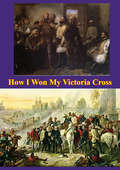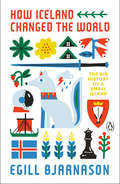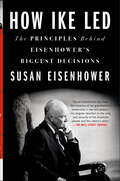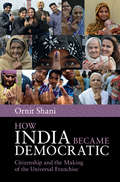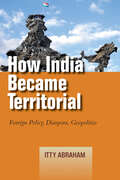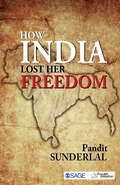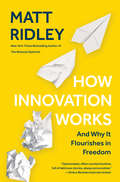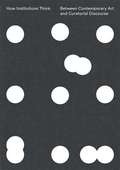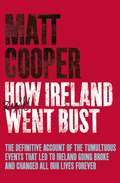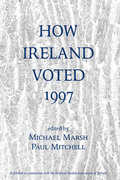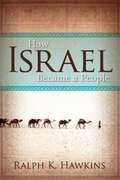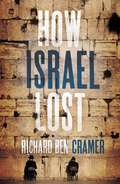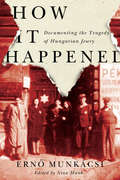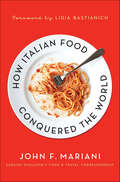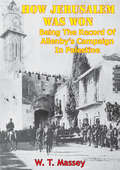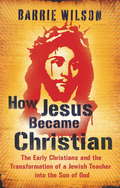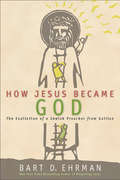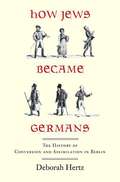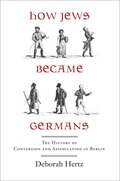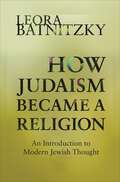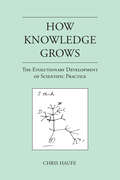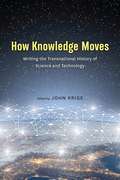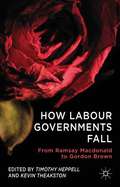- Table View
- List View
How I Stopped Being a Jew
by Shlomo Sand David FernbachShlomo Sand was born in 1946, in a displaced person's camp in Austria, to Jewish parents; the family later migrated to Palestine. As a young man, Sand came to question his Jewish identity, even that of a "secular Jew." With this meditative and thoughtful mixture of essay and personal recollection, he articulates the problems at the center of modern Jewish identity. How I Stopped Being a Jew discusses the negative effects of the Israeli exploitation of the "chosen people" myth and its "holocaust industry." Sand criticizes the fact that, in the current context, what "Jewish" means is, above all, not being Arab and reflects on the possibility of a secular, non-exclusive Israeli identity, beyond the legends of Zionism.From the Hardcover edition.
How I Won My Victoria Cross [Illustrated Edition]
by Thomas Henry Kavanagh VC[Illustrated with over one hundred maps, photos and portraits, of the battles, individuals and places involved in the Indian Mutiny]The siege of Lucknow remains, even after one hundred and fifty years have passed, the most iconic struggle of the Indian Mutiny of 1857; the British, their families and loyal sepoys were surrounded in the rambling buildings of the Residence. Other British forces were on their way to relieve the garrison, which was surrounded by 10,000 furious rebel troops and internally wracked by hunger, filth, cholera, dysentery and small pox. The question remained, would the relieving forces be able to reach the beleaguered men women and children in Lucknow in time?A hero emerged from the unlikeliest source; among the non-combatant civil service men holed up in the residence was an Irishman named Thomas Henry Kavanagh inspired by the chance to win undying glory. "I resolved to die in the struggle," he writes, "rather than survive it with no better fame than I took into it." He engaged in every dirty and dangerous job during the siege; leading a group of fellow civil service volunteers as a mobile reserve around the most embattled parts of the fortifications, manning field mortars, counter-tunnelling against a bomb attempt by the rebels.However, his lasting fame rests on his epic quest to escape the garrison disguised as a sepoy, and guide the relieving forces into the city of Lucknow and past the defences of the mutineers. This journey was as difficult as one can imagine and forms the subject of this famous book; the perilous journey would be recognized as one of the bravest feats of the entire conflict Kavanagh was awarded the coveted Victoria Cross for outstanding bravery, one of only five civilians to ever do so.
How Iceland Changed the World: The Big History of a Small Island
by Egill BjarnasonThe untold story of how one tiny island in the middle of the Atlantic has shaped the world for centuries.The history of Iceland began 1,200 years ago, when a frustrated Viking captain and his useless navigator ran aground in the middle of the North Atlantic. Suddenly, the island was no longer just a layover for the Arctic tern. Instead, it became a nation whose diplomats and musicians, sailors and soldiers, volcanoes and flowers, quietly altered the globe forever. How Iceland Changed the World takes readers on a tour of history, showing them how Iceland played a pivotal role in events as diverse as the French Revolution, the Moon Landing, and the foundation of Israel. Again and again, one humble nation has found itself at the frontline of historic events, shaping the world as we know it, How Iceland Changed the World paints a lively picture of just how it all happened.
How Ike Led: The Principles Behind Eisenhower's Biggest Decisions
by Susan Eisenhower“Lays bare the essence of [President Eisenhower’s] leadership in war and peace—his singular devotion to the unity and security of the American people.” —The Wall Street JournalFew leaders have made decisions as momentous—and varied—as Dwight D. Eisenhower. From D-Day to Little Rock, from the Korean War to Cold War crises, from the Red Scare to the Missile Gap controversies, Ike was able to give our country eight years of peace and prosperity by relying on a core set of principles. These were informed by his heritage and upbringing, as well as his strong character and personal discipline—but he also avoided making himself the center of things. He was a man of judgment, and a steadying force. He sought national unity by pursuing a course he called the “Middle Way” that tried to make winners on both sides of any issue.Ike was a strategic, not an operational leader, who relied on a rigorous pursuit of the facts for decision-making. His talent for envisioning a whole, especially in the context of the long game, and his ability to see causes and various consequences, explains his success as Allied Commander and as President. After making a decision, he made himself accountable for it, recognizing that personal responsibility is the bedrock of sound principles.Written by his granddaughter, a policy analyst and national security expert, How Ike Led reveals the personality, beliefs, and habits that allowed Eisenhower to lead America through a transformational time.“As good a picture of Ike as we have ever had.” —David Nichols, author of Eisenhower 1956“Highly personal anecdotes supplement [the author’s] research. Armchair historians will treasure this book.” —BooklistIncludes photographs
How India Became Democratic: Citizenship and the Making of the Universal Franchise
by Ornit ShaniHow India Became Democraticexplores the greatest experiment in democratic human history. It tells the untold story of the preparation of the electoral roll on the basis of universal adult franchise in the world's largest democracy. Ornit Shani offers a new view of the institutionalisation of democracy in India, and of the way democracy captured the political imagination of its diverse peoples. Turning all adult Indians into voters against the backdrop of the partition of India and Pakistan, and in anticipation of the drawing up of a constitution, was a staggering task. Indians became voters before they were citizens - by the time the constitution came into force in 1950, the abstract notion of universal franchise and electoral democracy were already grounded. Drawing on rich archival materials, Shani shows how the Indian people were a driving force in the making of democratic citizenship as they struggled for their voting rights.
How India Became Territorial: Foreign Policy, Diaspora, Geopolitics
by Itty AbrahamWhy do countries go to war over disputed lands? Why do they fight even when the territories in question are economically and strategically worthless? Drawing on critical approaches to international relations, political geography, international law, and social history, and based on a close examination of the Indian experience during the 20th century, Itty Abraham addresses these important questions and offers a new conceptualization of foreign policy as a state territorializing practice. Identifying the contested process of decolonization as the root of contemporary Asian inter-state territorial conflicts, he explores the political implications of establishing a fixed territorial homeland as a necessary starting point for both international recognition and national identity#151;concluding that disputed lands are important because of their intimate identification with the legitimacy of the postcolonial nation-state, rather than because of their potential for economic gains or their place in historic grievances. By treating Indian diaspora policy and geopolitical practice as exemplars of foreign policy behavior, Abraham demonstrates how their intersection offers an entirely new way of understanding India's vexed relations with Pakistan and China. This approach offers a new and productive way of thinking about foreign policy and inter-state conflicts over territory in Asia#151;one that is non-U. S. and non-European focused#151;that has a number of implications for regional security and for foreign policy practices in the contemporary postcolonial world.
How India Lost Her Freedom
by Pandit SunderlalA freedom fighter′s account of India′s struggle for independence. How the British came to India, slowly penetrated the sub-continent and established an empire is a story recorded by many historians but not fully told... The early British historians tried to play down the role of their countrymen in subjugating the native kingdoms in India by all means. It was left to a few diligent historians to carry out painstaking research and unravel the facts. Pandit Sunderlal, who wrote this sensational book originally in Hindi in 1929, vigorously exposed the British plan to enlarge their sphere of influence in India slowly and steadily through a number of dubious methods. Apart from revealing the state of affairs between the Indian native kingdoms and the East India Company, How India Lost Her Freedom provides a fine account of what India was prior to the advent of the British. The book focuses on the crucial facts and events that led to the establishment of British rule over India.
How Innovation Works: And Why It Flourishes in Freedom
by Matt RidleyBuilding on his national bestseller The Rational Optimist, Matt Ridley chronicles the history of innovation, and how we need to change our thinking on the subject.Innovation is the main event of the modern age, the reason we experience both dramatic improvements in our living standards and unsettling changes in our society. Forget short-term symptoms like Donald Trump and Brexit, it is innovation that will shape the twenty-first century. Yet innovation remains a mysterious process, poorly understood by policy makers and businessmen alike.Matt Ridley argues that we need to see innovation as an incremental, bottom-up, fortuitous process that happens as a direct result of the human habit of exchange, rather than an orderly, top-down process developing according to a plan. Innovation is crucially different from invention, because it is the turning of inventions into things of practical and affordable use to people. It speeds up in some sectors and slows down in others. It is always a collective, collaborative phenomenon, involving trial and error, not a matter of lonely genius. It happens mainly in just a few parts of the world at any one time. It still cannot be modeled properly by economists, but it can easily be discouraged by politicians. Far from there being too much innovation, we may be on the brink of an innovation famine.Ridley derives these and other lessons from the lively stories of scores of innovations, how they started and why they succeeded or failed. Some of the innovation stories he tells are about steam engines, jet engines, search engines, airships, coffee, potatoes, vaping, vaccines, cuisine, antibiotics, mosquito nets, turbines, propellers, fertilizer, zero, computers, dogs, farming, fire, genetic engineering, gene editing, container shipping, railways, cars, safety rules, wheeled suitcases, mobile phones, corrugated iron, powered flight, chlorinated water, toilets, vacuum cleaners, shale gas, the telegraph, radio, social media, block chain, the sharing economy, artificial intelligence, fake bomb detectors, phantom games consoles, fraudulent blood tests, hyperloop tubes, herbicides, copyright, and even life itself.
How Institutions Think: Between Contemporary Art and Curatorial Discourse
by Paul O'Neill Lucy Steeds Mick Wilson<p>Reflections on how institutions inform art, curatorial, educational, and research practices while they shape the world around us. <p>Contemporary art and curatorial work, and the institutions that house them, have often been centers of power, hierarchy, control, value, and discipline. Even the most progressive among them face the dilemma of existing as institutionalized anti-institutions. This anthology-taking its title from Mary Douglas's 1986 book, How Institutions Think-reconsiders the practices, habits, models, and rhetoric of the institution and the anti-institution in contemporary art and curating. Contributors reflect upon how institutions inform art, curatorial, educational, and research practices as much as they shape the world around us. They consider the institution as an object of inquiry across many disciplines, including political theory, organizational science, and sociology. <p>Bringing together an international and multidisciplinary group of writers, How Institutions Think addresses such questions as whether institution building is still possible, feasible, or desirable; if there are emergent institutional models for progressive art and curatorial research practices; and how we can establish ethical principles and build our institutions accordingly. The first part, "Thinking via Institution," moves from the particular to the general; the second part, "Thinking about Institution," considers broader questions about the nature of institutional frameworks.</p>
How Ireland Really Went Bust: The Definitive Account Of The Tumultous Events That Led To Ireland Going Broke And Changed All Our Lives For Ever
by Matt CooperThe definitive account of the tumultuous events that led to Ireland going broke in 2010From the night the Irish government guaranteed the debts of Irish banks in September 2008 Ireland was on a one-way road to ruin.In How Ireland Really Went Bust Matt Cooper, journalist, broadcaster and No 1 bestselling author of Who Really Runs Ireland?, describes the events that climaxed with the arrival of the heavy hitters from the IMF and the ECB in Government Buildings in November 2010 - and he assesses the fall-out of that fateful period in Ireland's recent history.Drilling deep into the human dramas, the business catastrophes, the economic collapse and the unprecedented political upheaval that characterised the time after the bank bailout, Cooper gets to the heart of what really happened. And he investigates the background of the key decisions and reveals why they were taken, and by whom, to throw new light on a period that changed Ireland forever.'A considerable piece of work ... read it and weep' Irish Times'Cooper's previous bestseller Who Really Runs Ireland? was an authoritative and hugely readable account that told you everything you needed to know about who's who in Ireland and the golden circles that linked business and politics for generations. How Ireland Really Went Bust is equally impressive' Irish Independent'A lively commentary with nuggets galore ... not just readable, but full of surprises' Sunday Independent '[A] brilliant achievement that should be read by anyone interested in the state of the nation' Evening Herald'Up-to-the-minute and exhaustive ... [Cooper] knows the players and they talk to him' Sunday Business Post
How Ireland Voted 1997 (Studies in Irish Politics)
by Michael Marsh<p>Since the elections of 1987, the Political Studies Association of Ireland has published books on each Irish general election. This latest volume covers the 1997 elections and is the first study to provide an in-depth analysis of both the campaign and the election results. <p>Written in an accessible and nontechnical style, the contributors are internationally acknowledged experts in party politics and elections. The book follows the tradition set in previous volumes in two respects: many of the contributors have written on the same topics in earlier volumes and, where appropriate, this book continues similar themes. However, How Ireland Voted 1997 places greater attention on the election campaign itself and the characteristics of the new Dail.</p>
How Israel Became a People
by Ralph K. HawkinsHow did Israel become a people? Is the biblical story accurate? In what sense, if any, is the biblical story true? Are the origins of these ancient people lost in myth or is there hope to discovering who they were and how they lived? These questions divide students and scholars alike.While many believe the "Conquest" is only a fable, this book will present a different view. Using biblical materials and the new archaeological data, this title tells how the ancient Israelites settled in Canaan and became the people of Israel.The stakes for understanding the history of ancient Israel are high. The Old Testament tells us that Yahweh led the Hebrews into the land of Canaan and commanded them to drive its indigenous inhabitants out and settle in their place. This account has often served as justification for the possession of the land by the modern state of Israel. Archaeology is a "weapon" in the debate, used by both Israelis and Palestinians trying to write each other out of the historical narrative. This book provides needed background for the issues and will be of interest to those concerned with the complexity of Arab-Israeli relations.
How Israel Lost: The Four Questions
by Richard Ben CramerOnce in a great while, a book comes along that not only discusses a topic of interest, it changes the boundaries of that discussion forever. This is such a book. InHow Israel LostRichard Ben Cramer analyzes the four questions that have bedeviled Israel and Palestine for almost forty years:I. Why Do We Care About Israel?II. Why Don't the Palestinians Have a State?III. What Is a Jewish State?IV. Why Is There No Peace?With personal observation and sharp and challenging argument, Cramer insists that Israel is losing her soul by maintaining her occupation of the lands conquered in the Six Day War. Israel has become a victim of that occupation no less than the Palestinians, who must have a nation of their own. Cramer makes clear for the first time why the occupation endures and how it corrupts and corrodes the societies of both Arab and Jew. Cramer's portrait of those societies is both up to the minute and timeless, enlivened at every step by his trademark humor, by humane understanding of the people caught in the conflict, and by his astonishing gift for language, theirs and ours. Both his observations and arguments are drawn with startling clarity, informed by the fierce and fearless reporting that won him the Pulitzer Prize for Middle East coverage twenty-five years ago. The result is a book destined to produce both heat and light -- it is both shocking and a delight to read. This is journalism so sharp that it will change the story it set out to tell.
How It Happened: Documenting the Tragedy of Hungarian Jewry
by Nina Munk Ernő Munkácsi Péter Balikó Lengyel Ferenc Laczó and László CsőszA gripping first-hand account of the devastating "last chapter" of the Holocaust, written by a privileged eyewitness, the secretary of the Hungarian Judenrat, and a member of Budapest's Jewish elite, How It Happened is a unique testament to the senseless brutality that, in a matter of months, decimated what was Europe’s largest and last-surviving Jewish community. Writing immediately after the war and examining only those critical months of 1944 when Hitler's Germany occupied its ally Hungary, Ernő Munkácsi describes the Judenrat's desperation and fear as it attempted to prevent the looming catastrophe, agonized over decisions not made, and struggled to grasp the immensity of a tragedy that would take the lives of 427,000 Hungarian Jews in the very last year of the Second World War. This long-overdue translation makes available Munkácsi's profound and unparalleled insight into the Holocaust in Hungary, revealing the "choiceless choices" that confronted members of the Judenrat forced to execute the Nazis' orders. With an in-depth introduction, a brief biography of Ernő Munkácsi, ample annotations by László Csősz and Ferenc Laczó, two dozen archival photographs, and detailed maps, How It Happened is an essential resource for historians and students of the Holocaust, the Second World War, and Central Europe.
How It Happens (Great Lakes Books Series)
by Jean Alicia ElsterHow It Happens follows the story of author Jean Alicia Elster’s maternal grandmother, Dorothy May Jackson. Born in Tennessee in 1890, Dorothy May was the middle daughter of Addie Jackson, a married African-American housekeeper at one of the white boardinghouses in town, and Tom Mitchell, a commanding white attorney from a prominent family. Through three successive generations of African-American women, Elster intertwines the fictionalized adaptations of the defining periods and challenges—race relations, miscegenation, sexual assault, and class divisions—in her family’s history. A continuation of the plots begun in Elster’s two novels Who’s Jim Hines? and The Colored Car, How It Happens continues the story for an older audience and begins with Addie’s life before the turn of the century in the South as a married Black woman with three biracial daughters navigating the relationship between her husband and Tom Mitchell. Later the story shifts to Addie’s daughter Dorothy May’s experiences both as a child and later, as a teacher who, choosing between her career and marriage to a man she barely knows, moves to Detroit. The story moves along with Dorothy May’s daughter Jean, who, with the support of her mother and the memory of her grandmother, confronts and comes to terms with her role in society and the options available to her as a college-educated Black woman in the post–World War II industrial North. While there is struggle and hardship for each of these women, they each build off one other and continue to demand space in the world in which they live. Written for young adult readers, How It Happens carries the heart through the obstacles that still face women of color today and persists in holding open the door of communication between generations.
How Italian Food Conquered the World
by John F. MarianiNot so long ago, Italian food was regarded as a poor man's gruel-little more than pizza, macaroni with sauce, and red wines in a box. Here, John Mariani shows how the Italian immigrants to America created, through perseverance and sheer necessity, an Italian-American food culture, and how it became a global obsession. The book begins with the Greek, Roman, and Middle Eastern culinary traditions before the boot-shaped peninsula was even called "Italy," then takes readers on a journey through Europe and across the ocean to America alongside the poor but hopeful Italian immigrants who slowly but surely won over the hearts and minds of Americans by way of their stomachs. Featuring evil villains such as the Atkins diet and French chefs, this is a rollicking tale of how Italian cuisine rose to its place as the most beloved fare in the world, through the lives of the people who led the charge. With savory anecdotes from these top chefs and restaurateurs: - Mario Batali- Danny Meyer- Tony Mantuano- Michael Chiarello- Giada de Laurentiis- Giuseppe Cipriani- Nigella LawsonAnd the trials and triumphs of these restaurants:- Da Silvano- Spiaggia- Bottega- Union Square Cafe- Maialino- Rao's- Babbo- Il Cantinori
How Jerusalem Was Won - Being the Record of Allenby’s Campaign in Palestine [Illustrated Edition]: Being the Record of Allenby’s Campaign in Palestine
by William Thomas MasseyIncludes the World War One In The Desert Illustration Pack- 115 photos/illustrations and 19 maps spanning the Desert campaigns 1914-1918"Written by the foremost accredited London newspaper journalist in the Middle East during the Great War, William Massey covered the war in the Middle East as it was fought against the Ottoman Turkish Empire, its German ally and the tribes of the region who supported them. He was aware of the hardships suffered by the British and Colonial troops serving in the difficult climate and later became a champion of those who fought there. He writes of the complete conflict from the battles in the western desert with the Senussi to Aleppo and beyond to the borders of Turkey."-Print Ed.
How Jesus Became Christian: The Early Christians And The Transformation Of A Jewish Teacher Into The Son Of God
by Barrie WilsonHow the early Christians rewrote history, turning a Jewish teacher and messiah into a 'Christian' man-deity, bringing eternal life to all who believeWe often forget the undeniable fact that Jesus was Jewish. He lived and died a Jew, teaching the religion of his forbears and living by the Torah. After his death there was a 'Jesus movement' led by Jesus' brother James in Jerusalem and a 'Christ movement' led by Paul (who never met Jesus) in the Diaspora. The Christ movement deliberately sought to replace and destroy the Jesus movement.The battles of the Jewish community against the Romans, and the chaos after the destruction of the Temple in Jerusalem in AD 70, helped Paul and his party to seduce Jesus' followers away from the strictures of Judaism. Having killed off the historical Jesus, the new Christians turned the religion away from a traditional emphasis on behaviour into the most successful personality cult in recorded history.
How Jesus Became God
by Bart D. EhrmanIn a book that took eight years to research and write, leading Bible scholar Bart D. Ehrman explores how an apocalyptic prophet from the backwaters of rural Galilee crucified for crimes against the state came to be thought of as equal with the one God Almighty Creator of all things. Ehrman sketches Jesus's transformation from a human prophet to the Son of God exalted to divine status at his resurrection. Only when some of Jesus's followers had visions of him after his death--alive again--did anyone come to think that he, the prophet from Galilee, had become God. And what they meant by that was not at all what people mean today.As a historian--not a believer--Ehrman answers the questions: How did this transformation of Jesus occur? How did he move from being a Jewish prophet to being God? The dramatic shifts throughout history reveal not only why Jesus's followers began to claim he was God, but also how they came to understand this claim in so many different ways.Written for secular historians of religion and believers alike, How Jesus Became God will engage anyone interested in the historical developments that led to the affirmation at the heart of Christianity: Jesus was, and is, God.
How Jews Became Germans: The History of Conversion and Assimilation in Berlin
by Deborah Hertz<P>When the Nazis came to power and created a racial state in the 1930s, an urgent priority was to identify Jews who had converted to Christianity over the preceding centuries. With the help of church officials, a vast system of conversion and intermarriage records was created in Berlin, the country’s premier Jewish city. Deborah Hertz’s discovery of these records, the Judenkartei, was the first step on a long research journey that has led to this compelling book. Hertz begins the book in 1645, when the records begin, and traces generations of German Jewish families for the next two centuries. <P>The book analyzes the statistics and explores letters, diaries, and other materials to understand in a far more nuanced way than ever before why Jews did or did not convert to Protestantism. Focusing on the stories of individual Jews in Berlin, particularly the charismatic salon woman Rahel Levin Varnhagen and her husband, Karl, a writer and diplomat, Hertz humanizes the stories, sets them in the context of Berlin’s evolving society, and connects them to the broad sweep of European history.
How Jews Became Germans: The History of Conversion and Assimilation in Berlin
by Deborah HertzA “very readable” history of Jewish conversions to Christianity over two centuries that “tracks the many fascinating twists and turns to this story” (Library Journal).When the Nazis came to power and created a racial state in the 1930s, they considered it an urgent priority to identify Jews who had converted to Christianity over the preceding centuries. With the help of church officials, a vast system of conversion and intermarriage records was created in Berlin, the country’s premier Jewish city. Deborah Hertz’s discovery of these records, the Judenkartei, was the first step on a long research journey that led to this compelling book. Hertz begins the book in 1645, when the records begin, and traces generations of German Jewish families for the next two centuries.The book analyzes the statistics and explores letters, diaries, and other materials to understand in a far more nuanced way than ever before why Jews did or did not convert to Protestantism. Focusing on the stories of individual Jews in Berlin, particularly the charismatic salon woman Rahel Levin Varnhagen and her husband, Karl, a writer and diplomat, Hertz brings out the human stories behind the documents, sets them in the context of Berlin’s evolving society, and connects them to the broad sweep of European history.
How Judaism Became a Religion: An Introduction to Modern Jewish Thought
by Leora BatnitzkyA new approach to understanding Jewish thought since the eighteenth centuryIs Judaism a religion, a culture, a nationality—or a mixture of all of these? In How Judaism Became a Religion, Leora Batnitzky boldly argues that this question more than any other has driven modern Jewish thought since the eighteenth century. This wide-ranging and lucid introduction tells the story of how Judaism came to be defined as a religion in the modern period—and why Jewish thinkers have fought as well as championed this idea.Ever since the Enlightenment, Jewish thinkers have debated whether and how Judaism—largely a religion of practice and public adherence to law—can fit into a modern, Protestant conception of religion as an individual and private matter of belief or faith. Batnitzky makes the novel argument that it is this clash between the modern category of religion and Judaism that is responsible for much of the creative tension in modern Jewish thought. Tracing how the idea of Jewish religion has been defended and resisted from the eighteenth century to today, the book discusses many of the major Jewish thinkers of the past three centuries, including Moses Mendelssohn, Abraham Geiger, Hermann Cohen, Martin Buber, Zvi Yehuda Kook, Theodor Herzl, and Mordecai Kaplan. At the same time, it tells the story of modern orthodoxy, the German-Jewish renaissance, Jewish religion after the Holocaust, the emergence of the Jewish individual, the birth of Jewish nationalism, and Jewish religion in America.More than an introduction, How Judaism Became a Religion presents a compelling new perspective on the history of modern Jewish thought.
How Knowledge Grows: The Evolutionary Development of Scientific Practice
by Chris HaufeAn argument that the development of scientific practice and growth of scientific knowledge are governed by Darwin&’s evolutionary model of descent with modification.Although scientific investigation is influenced by our cognitive and moral failings as well as all of the factors impinging on human life, the historical development of scientific knowledge has trended toward an increasingly accurate picture of an increasing number of phenomena. Taking a fresh look at Thomas Kuhn&’s 1962 work, The Structure of Scientific Revolutions, in How Knowledge Grows Chris Haufe uses evolutionary theory to explain both why scientific practice develops the way it does and how scientific knowledge expands. This evolutionary model, claims Haufe, helps to explain what is epistemically special about scientific knowledge: its tendency to grow in both depth and breadth.Kuhn showed how intellectual communities achieve consensus in part by discriminating against ideas that differ from their own and isolating themselves intellectually from other fields of inquiry and broader social concerns. These same characteristics, says Haufe, determine a biological population&’s degree of susceptibility to modification by natural selection. He argues that scientific knowledge grows, even across generations of variable groups of scientists, precisely because its development is governed by Darwinian evolution. Indeed, he supports the claim that this susceptibility to modification through natural selection helps to explain the epistemic power of certain branches of modern science. In updating and expanding the evolutionary approach to scientific knowledge, Haufe provides a model for thinking about science that acknowledges the historical contingency of scientific thought while showing why we nevertheless should trust the results of scientific research when it is the product of certain kinds of scientific communities.
How Knowledge Moves: Writing the Transnational History of Science and Technology
by John KrigeKnowledge matters, and states have a stake in managing its movement to protect a variety of local and national interests. The view that knowledge circulates by itself in a flat world, unimpeded by national boundaries, is a myth. The transnational movement of knowledge is a social accomplishment, requiring negotiation, accommodation, and adaptation to the specificities of local contexts. This volume of essays by historians of science and technology breaks the national framework in which histories are often written. Instead, How Knowledge Moves takes knowledge as its central object, with the goal of unraveling the relationships among people, ideas, and things that arise when they cross national borders. This specialized knowledge is located at multiple sites and moves across borders via a dazzling array of channels, embedded in heads and hands, in artifacts, and in texts. In the United States, it shapes policies for visas, export controls, and nuclear weapons proliferation; in Algeria, it enhances the production of oranges by colonial settlers; in Vietnam, it facilitates the exploitation of a river delta. In India it transforms modes of agricultural production. It implants American values in Latin America. By concentrating on the conditions that allow for knowledge movement, these essays explore travel and exchange in face-to-face encounters and show how border-crossings mobilize extensive bureaucratic technologies.
How Labour Governments Fall
by Timothy Heppell Kevin TheakstonWhat similarities exist between the reasons for Labour losing office in 2010 and those behind why previous Labour governments were defeated? This edited volume provides a detailed historical appraisal which considers the importance of themes such as economic performance; political leadership and the condition of the Conservatives in opposition.

